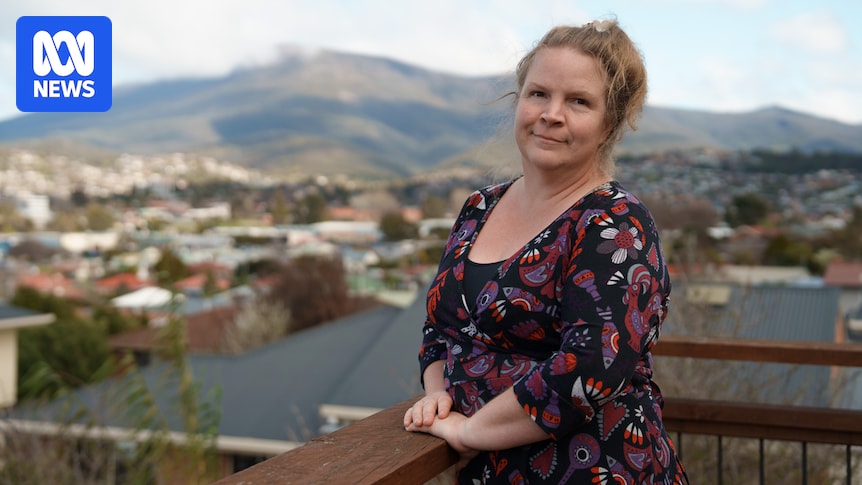“Socially infertile” is a turn of phrase, Bec Haight wryly remarks, that is as “charming” as it sounds.
“It is just a classic, soulless medical term,” she says.
“I was deemed ‘socially infertile’ because I had no partner to go through the IVF [in vitro fertilisation] process with.”
Until earlier this year, women, like Ms Haight, generally had to pay thousands of dollars for at least two rounds of fertility procedures before they were treated the same as a “medically infertile” heterosexual couple.
It was only then they were eligible for Medicare rebates — a policy a new class action alleges was discriminatory towards single women and those in same-sex relationships.
Bec Haight said she had to spend thousands of dollars on fertility procedures before Medicare rebates “kicked in”. (ABC News)
Ms Haight, a mother-of-two from Hobart, remembers withdrawing equity from her home to help fund the treatments, including intra-uterine insemination (IUI) — a type of artificial insemination.
“[My doctor] was very up-front that, because I was ‘socially infertile,’ I had to do three procedures to show that I did actually need fertility assistance before the Medicare rebates would kick in,” she said.
“I’m pretty sure my initial layout was $12,000 to $15,000 just to get through the first three procedures that they needed, so that was out-of-pocket, from my mortgage.
“[It] has had an impact to this day, of course, but I’m still very lucky to have a home in this day and age and two beautiful children, [it’s] an absolute privilege.”
Bec Haight said it is a “privilege” to now have two children. (ABC News: Briana Shepherd)
Call for changes
Last year, fertility specialists called for changes, declaring Medicare’s previous definition of infertility as “outdated”. They described parenthood and raising children in a loving home as “a fundamental human right”.
In April, the federal government announced it was expanding Medicare’s definition of infertility, meaning single women and those in same-sex relationships could access IVF subsidies without having to first prove “medical infertility”.
“For too long single women and lesbians faced barriers when it came to access IVF. It was expensive, it was unfair, and it was just plain wrong,” Assistant Minister Ged Kearney wrote in a post on social media.
In April, the federal government announced it was expanding Medicare’s definition of infertility. (ABC News: Matt Roberts)
Ms Haight, who has an eight-year-old daughter and four-year-old son, said she welcomes the legal action as a chance to “make sure the world is a better place for my children”.
“Even though the government has since remediated its discriminatory policies … I don’t think the government really listens unless people with big lawyers take them to court,” she said.
The class action, filed by law firm JGA Saddler in the Federal Court in July, alleges the Commonwealth unlawfully prevented class members, such as Ms Haight, from accessing rebates for fertility treatments on the grounds single women and those in same-sex relationships, were “socially infertile,” not “medically infertile,” and therefore ineligible for support. It alleges the conduct breached the Sex Discrimination Act.
The firm estimates there could be between 40,000 and 50,000 class members.
Managing director Jan Saddler said the women had to undergo “unnecessary” procedures to get to the same point as a heterosexual couple.
“It is a challenging enough journey without having to pay extra costs others don’t have to pay and also subject yourself to medical procedures others don’t have to,” she said.
Managing director Jan Saddler says the women had to undergo “unnecessary” procedures.
“They were really being [treated differently] because they were single women and same-sex women.”
Ms Saddler said the Medicare changes have “happened to late” for “so many women”.
“We’ve heard of women having to borrow money from family, draw down on any excess in mortgage they might have, work overtime, work extra shifts, to pay for those services,” she said.
‘Makes no sense’
Victorian Juliette Remfrey, 41, resorted to raiding her superannuation to help pay for fertility treatment.
The public servant said she found herself as single and in her 30s, with her fertility window closing, wanting desperately to start a family after ending long-term relationships with men because they did not want children.
Juliette Remfrey with her first child. (Supplied)
One of her fallopian tubes had also been removed due to an ectopic pregnancy before she sought help from a fertility clinic as a single woman.
She paid thousands of dollars for two unsuccessful rounds of artificial insemination without being eligible for Medicare rebates before she could be dubbed medically infertile, enabling her to then claim for IVF.
“It makes no sense that they had separate classifications for someone accessing fertility treatment as being socially infertile just because you don’t have a partner,” the now-mother-of-two said.
What to ask your IVF clinic in the wake of the Monash IVF bungle
“The policies were just really discriminatory at the time. A couple could have walked in and gone straight to IVF, gone straight to Medicare rebates, but as a solo person, I couldn’t.”
Michelle Galea, founder of Australian Solo Mothers by Choice, said the previous policy was “unfair” and “unjust,” with people campaigning for years to have it changed.
“Without a Medicare rebate, IVF is quite prohibitive,” she says.
In a statement, a spokesperson for the federal health department said the department is aware that a representative proceeding was lodged in the Federal Court on July 18.
“As this matter is before the Court, it is not appropriate to comment,” the spokesperson said.
The class action is seeking compensation for financial losses and emotional pain.
But for Ms Haight and Ms Remfrey, they also hope the case sends a clear message to policy makers.
“I think the people who make these policies and labels sometimes forget there are actual humans involved here,” Ms Haight said.

